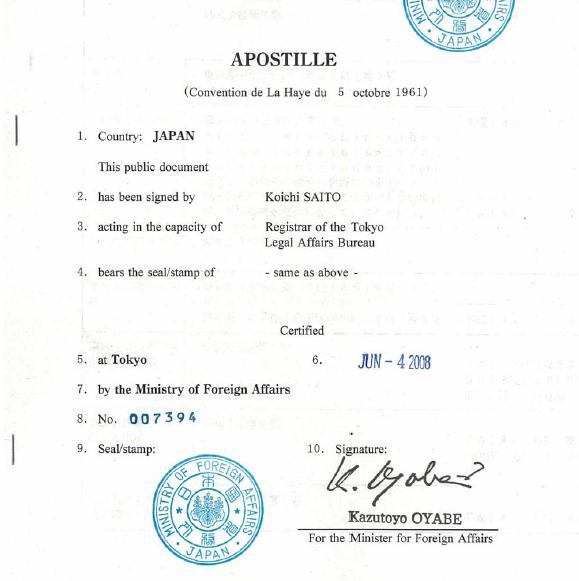When a French official document needs to be presented abroad, one key question almost always arises: how can its authenticity be guaranteed? To address this issue, the Hague Convention of 5 October 1961, also known as the Apostille Convention, established a simple and universally recognized mechanism: the apostille.
What is an apostille?
An apostille is an official certification that confirms the authenticity of the signature, the capacity in which the person signing the document has acted, and, where appropriate, the identity of the seal or stamp affixed to a public document.
It does not validate the content of the document, but solely its formal authenticity. In practice, it takes the form of a stamp or an additional page attached to the document, bearing the heading “Apostille – Convention de La Haye du 5 octobre 1961.”
In France, the apostille regime is governed by Decree No. 2007-1205 of 10 August 2007 on apostille and legalization, which implements the 1961 Convention. The apostille replaces the lengthy and complex process of diplomatic or consular legalization.
Which documents can be apostilled?
The apostille applies to public documents within the meaning of the Convention, including:
- civil status records (birth, marriage, and death certificates);
- judicial decisions (judgments, rulings);
- notarial acts;
- diplomas issued by public institutions;
- certain administrative documents (certificates, extracts from criminal records, etc.).
By contrast, documents drawn up by private individuals or of a commercial nature (such as invoices) do not fall within the scope of the apostille and require other forms of certification.
Which authority is competent in France?
Since the 2007 reform, French Courts of Appeal are competent to issue apostilles. Anyone may apply to the registry of the Court of Appeal in whose jurisdiction the public document was issued. The procedure is free of charge and relatively quick.
It should be noted that some documents issued by the Ministry of Justice or the Ministry for Europe and Foreign Affairs may be handled by specific services.
Which countries recognize the apostille?
The apostille is valid only in countries that are signatories to the Hague Convention of 5 October 1961. Today, more than 120 States recognize this system, including:
- In Europe: nearly all EU Member States, Switzerland, the United Kingdom, Norway…
- In the Americas: the United States, Mexico, Brazil, Argentina, Chile…
- In Asia-Pacific: Japan, Australia, India, South Korea, New Zealand…
- In Africa: South Africa, Morocco, Tunisia, Botswana, Cape Verde…
The complete and up-to-date list of States parties is available on the official website of the Hague Conference on Private International Law (HCCH).
For non-signatory countries, however, the traditional process of diplomatic and consular legalization remains necessary.
Why is the apostille important?
The apostille is a key tool for simplifying international procedures for citizens, businesses, and public authorities. It facilitates global mobility by significantly reducing administrative burdens. A student enrolling at a foreign university, a couple marrying abroad, or a company signing a contract outside France can have their official documents recognized quickly and securely.
In short, the apostille perfectly illustrates the commitment of States to simplify international exchanges while ensuring legal certainty. To determine whether a document requires an apostille, it is always essential to check two factors: the nature of the document and the status of the destination country in relation to the Hague Convention.


